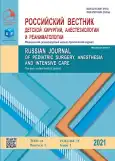Миниинвазивное хирургическое лечение детей с недержанием кала аутожиром
- Авторы: Пинигин А.Г.1, Кузьмичев П.П.2, Марочко Н.В.2, Ермолаева В.А.3, Березуцкий С.Н.1
-
Учреждения:
- Дальневосточный государственный медицинский университет
- Институт повышения квалификации специалистов здравоохранения
- Детская краевая клиническая больница имени А.К. Пиотровича
- Выпуск: Том 11, № 1 (2021)
- Страницы: 55-62
- Раздел: Оригинальные исследования
- URL: https://journal-vniispk.ru/2219-4061/article/view/123494
- DOI: https://doi.org/10.17816/psaic686
- ID: 123494
Цитировать
Полный текст
Аннотация
Введение. Недержание кала у детей, как следствие хронической функциональной задержки стула, — распространенная и актуальная проблема. Данное страдание относится к социально неприемлемым. Кроме того, нет единых взглядов на патогенез, диагностику и выбор оптимального метода лечения. Для ускоренного восстановления процесса удержания кала и купирования фекальной инконтиненции у детей необходима разработка новых методов хирургического лечения.
Цель исследования. Изучить новый миниинвазивный метод восстановления замыкательного аппарата прямой кишки с использованием аутожира.
Материалы и методы. В группу исследования вошел 31 пациент в возрасте от 4 до 17 лет с хронической задержкой стула, сочетающейся с фекальной инконтиненцией более 1 раза в неделю при отсутствии нарушений целостности сфинктеров и мышц тазового дна, находившийся на амбулаторном и стационарном лечении с 2016 по 2019 г. Помимо общеклинических методов, ультразвукового исследования и ирригоскопии был применен метод спиральной компьютерной томографии толстой кишки и виртуальной колоноскопии. При неэффективном консервативном методе лечения в течение 4–6 мес., удлинении пуборектальной мышцы и увеличении аноректального угла более 100 градусов проводилось малоинвазивное хирургическое вмешательство, заключающееся в коррекции аноректального угла аутожиром.
Результаты. Анализ жалоб группы оперированных миниинвазивным способом пациентов показал, что через 3 мес. уменьшилась тяжесть хронической задержки стула вплоть до полного восстановления регулярного стула после операции (34,5 %). Полное отсутствие фекальной инконтиненции после малоинвазивного лечения через 3 мес. выявлено у 83 % детей.
Заключение. Введение аутожира ретроректально приводит к быстрому устранению фекальной инконтиненции, нормализации частоты стула и улучшению качества жизни.
Ключевые слова
Полный текст
Открыть статью на сайте журналаОб авторах
Алексей Геннадьевич Пинигин
Дальневосточный государственный медицинский университет
Автор, ответственный за переписку.
Email: alpinig@yandex.ru
ORCID iD: 0000-0002-9602-2858
SPIN-код: 9964-0705
канд. мед. наук
Россия, 680000, Хабаровск, ул. Карла Маркса, д. 35Павел Павлович Кузьмичев
Институт повышения квалификации специалистов здравоохранения
Email: kuzmichev.pavel@mail.ru
ORCID iD: 0000-0002-9168-9442
SPIN-код: 9932-1272
д-р мед. наук, профессор
Россия, 680000, Хабаровск, ул. Карла Маркса, д. 35Наталья Владимировна Марочко
Институт повышения квалификации специалистов здравоохранения
Email: marochko66@mail.ru
канд. мед. наук
Россия, 680000, Хабаровск, ул. Карла Маркса, д. 35Валентина Александровна Ермолаева
Детская краевая клиническая больница имени А.К. Пиотровича
Email: ermolaeva.valent@gmail.com
ORCID iD: 0000-0001-9078-9460
SPIN-код: 7298-7946
врач лучевой и функциональной диагностики
Россия, 680000, Хабаровск, ул. Карла Маркса, д. 35Сергей Николаевич Березуцкий
Дальневосточный государственный медицинский университет
Email: s79242147010b@yandex.ru
SPIN-код: 5966-4748
канд. мед. наук
Россия, 680000, Хабаровск, ул. Карла Маркса, д. 35Список литературы
- Vvan Dijk M, Bongers ME, de Vries GJ, et al. Behavioral therapy for childhood constipation: a randomized, controlled trial. Pediatrics. 2008;121(5):e1334–e1341. doi: 10.1542/peds.2007-2402
- Nurko S, Scott SM. Coexistence of constipation and incontinence in children and adults. Best Pract Res Clin Gastroenterol. 2011;25(1):29–41. doi: 10.1016/j.bpg.2010.12.002
- Timmerman MEW, Trzpis M, Broens PMA. The problem of defecation disorders in children is underestimated and easily goes unrecognized: a cross-sectional study. Eur J Pediatr. 2019;178(1):33–39. doi: 10.1007/s00431-018-3243-6
- van den Berg MM, Bongers ME, Voskuijl WP, Benninga MA. No role for increased rectal compliance in pediatric functional constipation. Gastroenterology. 2009;137(6):1963–1969. doi: 10.1053/j.gastro.2009.08.015
- Parks AG, Swash M, Urich H. Sphincter denervation in anorectal incontinence and rectal prolapse. Gut. 1977;18(8):656–665. doi: 10.1136/gut.18.8.656
- Pisklakov AV. Rasprostranennost’ narushenij funkcii tazovyh organov u detej mladshego shkol’nogo vozrasta. Pediatrics. 2012;91(4):21–25. (In Russ.)
- Müller C, Belyaev O, Deska T, Chromik A, et al. Fecal incontinence: an up-to-date critical overview of surgical treatment options. Langenbecks Arch Surg. 2005;390(6):544–552. doi: 10.1007/s00423-005-0566-3
- Hayden DM, Weiss EG. Fecal incontinence: etiology, evaluation, and treatment. Clin Colon Rectal Surg. 2011;24(1):64–70. doi: 10.1055/s-0031-1272825
- Colares JHF, Purcaru M, da Silva GPF, et al. Impact of the Bowel Management Program on the quality of life in children with fecal incontinence. Pediatric Surgery International. 2016;32(5):471–476. doi: 10.1007/s00383-016-3874-5
- Rothbarth J, Bemelman WA, Meijerink WJ, et al. What is the impact of fecal incontinence on quality of life? Dis Colon Rectum. 2001;44(1):67–71. doi: 10.1007/BF02234823
- Dos Santos J, Marcon E, Pokarowski M, et al. Assessment of Needs in Children Suffering From Refractory Non-neurogenic Urinary and Fecal Incontinence and Their Caregivers’ Needs and Attitudes Toward Alternative Therapies (SNM, TENS). Front Pediatr. 2020;8:558. doi: 10.3389/fped.2020.00558
- Kirgizov IV, Linnik AV, Shishkin IA, et al. Assessment of the quality of life in children with compromised defecation. Pediatric Surgery. 2011;(2):21–23. (In Russ.)
- Anandam JL. Surgical management for fecal incontinence. Clin Colon Rectal Surg. 2014;27(3):106–109. doi: 10.1055/s-0034-1383902
- Komissarov IA, Vasil’ev SV, Nedozimovannyi AI, Dement’eva EA. Experience of application of volume forming agent «dam+» in treatment of anal incontinence associated with incompetence and trauma of anal sphincter. Grekov’s bulletin of Surgery. 2016;175(5):78–81. (In Russ.) doi: 10.24884/0042-4625-2016-175-5-78-81
- Patent RUS No. 25539188/ 28.11.2014 Kuzmichev PP, Pinigin AG. Sposob lechenija jenkopreza. Available from: https://rusneb.ru/catalog/000224_000128_2013129173_20141227_A_RU (In Russ.)
Дополнительные файлы










